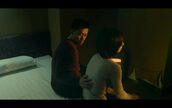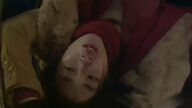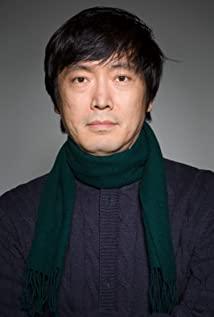To say that this movie is the Northeast version of "Walking in the White Night" is nonsense. It was obviously changed according to the script of "The Third Man", and a scene of a Ferris wheel was forced. From the plot point of view, the scene of the Ferris wheel is so contrived that Zhang Zili would not use such a euphemistic way, preparing to tell the truth on the Ferris wheel like Conan? All I can say director you really like Carol Reed.
From the beginning to the end, a few wretched men were peeping, stalking, and looking at Gui Lunmei. The laundry owner, Zhang Zili, and Liang Zhijun all showed a lack and anxiety of men: the laundry owner could only watch prostitutes wearing skirts, but nothing Can't do it; Liang Zhijun is a living dead, he kills all the followers around Gui Lunmei, but he can't possess Gui Lunmei; Zhang Zili is even more obscene, he first divorced his wife, and when he sent her away, he repeatedly asked to have sex with her again. Injured and can no longer be a police officer (lost the pistol), and finally he threatened Gui Lunmei with fireworks during the day on the Ferris wheel, implying her to "be more active", but the girl reported the girl the next day after going to bed, and then In front of the leaders, nod and bow down to please, flatter, and drink. The men in this film all show a huge anxiety and sexual repression, as if only by peeping and tormenting a woman can get the raw power of life.
But as the most important image of the femme fatale in film noir, Gui Lunmei can't see that kind of strong sexual life drive. If it is said that the director wanted to cover up the mystery before the film (although this mystery is nothing to cover up, anyone who has read a few mystery novels can guess it), so he deliberately portrayed Gui Lunmei as a harmless person who can only be peeped. The innocent victims; then when Liang Zhijun died, Gui Lunmei should show some initiative in her own life - even if it is to portray her as a green tea bitch with strong sexual desire and dissatisfaction? She killed because of cheating, and she forced Liang Zhijun to death because she did not want to be Liang Zhijun's personal belongings. If so, then she is also a subject with her own will to live.
But from the beginning to the end, we can only see a pitiful and bullying woman, and even her motive for killing was because she couldn't pay 20,000 yuan, was coerced, and was raped, so she resisted angrily. . It was her husband who did the dismembering and throwing the corpse. She didn't know anything, and since then she has become the wife of a living dead. The shaping of such a woman, to be honest, I think it is quite a failure. She is passive from beginning to end, and even murder is passive.
In the movie, Gui Lunmei was always crying. The first scene where she appeared without even a face, she was crying while covering her face. The camera shot her through the beaded curtain hanging on the door, completely from a peeping perspective. Through the gap under the curtains I could see her slender white legs, and her beautiful feet in the sandals (well, that's my own bad taste). This appearance set the tone for her in the whole movie. She is such a peeped object. Even after watching the movie, you can't tell what Gui Lunmei's character is like? Which ones are her disguise and which ones are her original intentions.
Only two scenes made me feel that Gui Lunmei is really a femme fatale. One was when she went to see her husband, Liang Zhijun. She had already betrayed her husband. Then she walked to the window sill and lit a cigarette. The reflection of the white snow outside the window reflected her black back, and the smoke filled her. The other scene was that after she and Zhang Zili went to bed, the two had breakfast (I hope this was her voluntary choice, rather than being threatened by Zhang Zili), she put on lipstick and was full of charm.
Well, maybe the director just wanted to reflect how anxious and shrinking men in this society repress and persecute women. But the ending expresses the director's true concept, the daytime fireworks. That was Zhang Zili's performance and consolation for her before she was taken back to the police station after Zhang Zili betrayed Gui Lunmei. I think the director is a little moved by himself, anyway Zhang Zili is a little intoxicated. As director Diao Yinan said later in the interview of "Popular Movies", this man betrayed Gui Lunmei for justice at first, but after that, he suddenly realized that it was love.
I really want to complain about how this is love. You obviously used this to threaten people before going to bed with them, and you haven't kept your promise. After going to bed, you still reported it to the police. If I were Gui Lunmei, I would definitely have greeted Zhang Zili's eighth ancestors in my heart. In the face of the last daytime fireworks, I would have been very self-restrained not to yell at me. How could I show a gratifying smile like Gui Lunmei?
Zhang Zili's image is actually very similar to Stuart in Vertigo. He has his own gender anxiety (Stuart is afraid of heights, he is an alcoholic and can't be a policeman), and he alleviates this anxiety by tracking and monitoring a woman, Finally got this woman, but destroyed this woman. But Hitchcock didn't make Stewart really fully recover after destroying the woman (at least that's debatable), and it feels like director Diao Yinan really made Zhang Zili fully recover. After regaining the recognition of his colleagues and leaders, he went to the ballroom for a dance (Liao Fan's performance was really good), and the feeling of regaining his vitality came out spontaneously. And this vitality is obtained by betraying a woman.
And even so, the director actually thought that he also got love at the same time! What kind of unequal love can only be imagined by a male plot of narcissism and inferiority?
If the film ends with Zhang Zili dancing, it even ends with him having a drink with his colleagues at the wine table, while Gui Lunmei is in prison. I would have thought that the director was at least critical of the anxious and inferior men in the film. But at the end of the fireworks scene, what I saw was that the director offered the best comfort to these men, so I can only give this movie three stars.
View more about Black Coal, Thin Ice reviews











